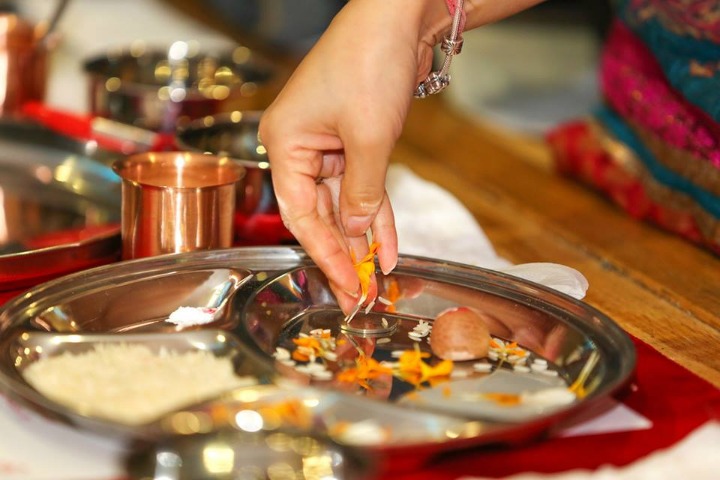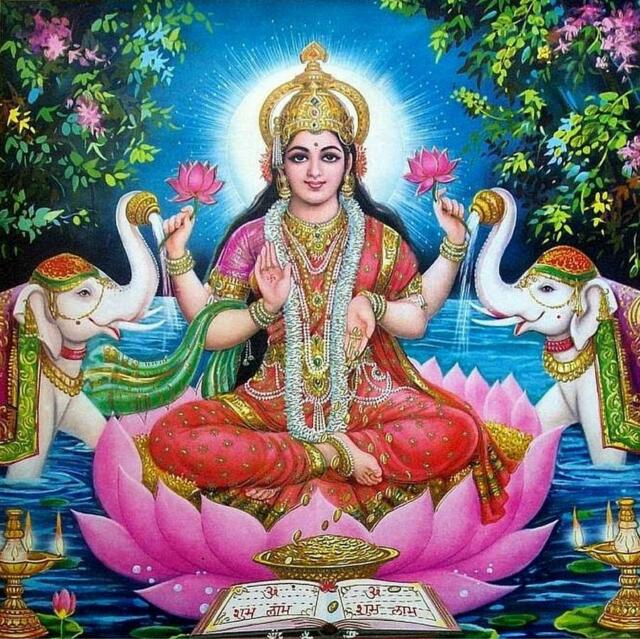Lakshmi (Chopda) Virtual Poojan
Saturday, 14 Nov 2020
The day of Darsha Amavasya is considered an auspicious day for offerings to Goddess Lakshmi. It also marks the third day of the grand festival of Diwali, this year it falls on Saturday 14th November.
Stanmore Mandir will be holding a special opportunity for all devotees to offer prayers by taking part in the Lakshmi Poojan. This will be virtual only.
Instructions For Poojan
- Instructions For Live Poojan starting at 6pm
- Please be seated on a aasan.
- Display your Chopda (Book keeping) in front of you.
- If poojan is done jointly by a couple, Wife to be seated on the Right Hand Side of the Husband. The rest of the family members can also join the Poojan.
- Follow the instructions given by Maharaj.
Items available in samagri pack
| Nadachadi | Abil | Gulal | Kanku |
Items Required for Pujan
| Lakshmiji murti | Ganapati murti | Coin | Nadachadi |
| Abil | Gulal | Kanku | Water |
| 3x Flowers | Ladoo | Napkin | Red Pen |
| Pettycash book | Rice | 2x Dishes | 2x Paan leaves |
| 1x Aarti Thali | 2x Spoons | ||
| Panchamrut (Dahi - Yogurt, Dudh - Milk, Ghee, Madh - Honey, Grounded Sakar) | |||

Please note For those that do not have Pooja samagri, mandir will be able to send you the samagri pack consisting of Kumkum, Abil, Gulal, Chandan, Sopari and Nada Chedi by post. If you require fill in the online application form before 8th November 2020.

Learn about Laxmi Poojan
The day of Darsha Amavasya is considered an auspicious day for offerings to Goddess Lakshmi. It also marks the third day of the grand festival of Diwali.
Diwali is usually synonymous with Maha Lakshmi poojan, the worship of the goddess of wealth, however, before the main Lakshmi poojan is done, Goddess Saraswati, the goddess of education and knowledge is first welcomed. In most cultures on the day of Diwali they both hold equal importance.
As per tradition, on the day of Diwali before the Maha Lakshmi Pooja is carried out, ledger books or account books are worshiped in front of Goddess Saraswati, Lakshmi and Lord Ganesha, signifying the start of the new financial year according to the Hindu calendar.
In India this pooja is known by different names in various parts of the country. In Gujarat it's better known as Chopda (meaning book) poojan in North India it’s known as Bhai-Khata, and Sharda (meaning Goddess Saraswati) pooja and Muhurat poojan for others.
This poojan is not just important for the business community who close all their accounts and present their 'Chopda', seeking blessing from the deities for a successful financial new year but It is just as important for all households to carry out this poojan to seek blessings for the prosperity of the household.
According to the Hindu calendar, financial year starts from the next day of Diwali. Traditionally accounting books are known as Chopda, However, in the era of computer and Internet, importance of Chopda has been marginalized as most businesses use laptops and accounting software to manage their financials. But it doesn't change the significance of Chopda Poojan as businessmen use their laptop as Chopda and worship it in front of deities. In current time Swastika, Om and Shubh-Labh are drawn at top of the laptop instead of the Chopda.